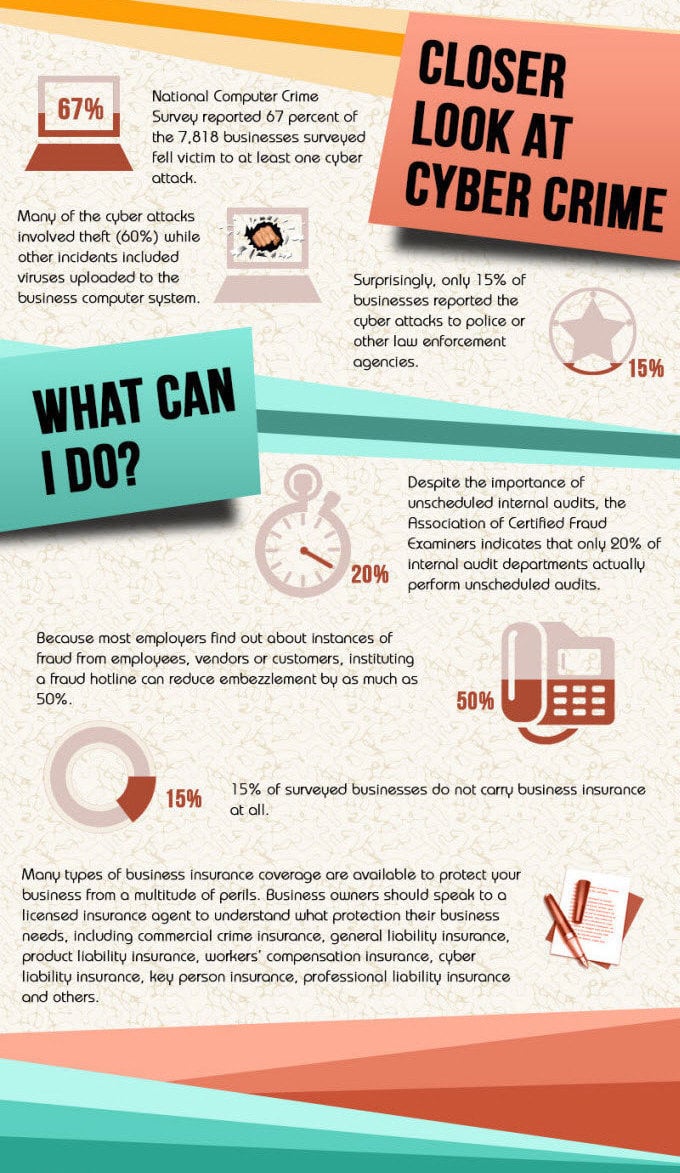How secure are your small business assets from fraud, identity theft and cybercrime?
Sixty-five percent of surveyed businesses said they are not sufficiently budgeted for online security. The number increases to 71 percent for those with revenues under $10 million. Small businesses also have a higher fraud rate than larger companies and non-business owners. One of the most frequent sources of fraud is credit card abuse – largely due to the fact that few business owners actually take the time to go through every line item on their bill or choose to mingle business and personal accounts.
Other sources of fraud stem from an overall lack of security across the business – such as inadequate network and computer security and a lack of background checks when hiring employees.

Don’t be a victim! Here are some tips you can take to better protect your business from some common forms of fraud and cybercrime.
Protect Your Credit Cards and Bank Accounts
Since this is a common area of fraud for everyone from sole proprietors to employee-based firms, this one goes at the top of the list. Start by separating your personal banking and credit cards from your business accounts – this will ensure frauds don’t get their hands on ALL your money. Separating your accounts will also make it easier to track your business expenses and report deductions on your tax return.
Next, make sure you use your card wisely. Don’t hand over your plastic or your card number to employees or companies with which you don’t have a familiar relationship. Switch to online bill pay or make sure you store paper bills securely. Likewise, use a secure mailbox for receiving and sending bills. If you don’t have one, deposit your mail directly at the post office (this goes for any mail that contains sensitive information – you don’t want to leave it lying around in an unsecured mailbox).
Lastly, be sure to check your online banking every day for suspicious activity.
Secure Your IT Infrastructure
Every business owner should invest in a firewall as well as anti-virus, malware and spyware detection software. Backup is also a must and will make it a lot easier for you to continue working in the event of a cyber attack. We recommend using Pavis for your backup needs.
We recommend keeping your information on the cloud to keep your information secure. In a business setting, if an employee leaves, all the company has to do is remove the former employee’s login information and they no longer have access to any company information. We have plenty of articles about how the cloud can keep you secure.
Use a Dedicated Computer for Banking
Use a dedicated computer for all your online financial transactions and, ideally, make sure it’s one that isn’t used for other online activity such as social media, email and web-surfing which can open up the machine to vulnerabilities. Avoid mobile banking if you can.
Have a Password Policy
Another easy step you can take to protect your IT systems is to institute a password policy. We have password policies here and you should too.
- Make sure you and your employees change them regularly (every 60 to 90 days is good rule)
- Set rules that ensure passwords are complex (i.e. contain one upper case letter, one number and must be a minimum of eight characters)
- Use different passwords for different online and system accounts
Educate Your Staff
Employees are perhaps your biggest point of vulnerability when it comes to fraud, but they are also your first line of defense. Train employees by instituting policies that guide employees on the proper use and handling of company confidential information, including financial data, personnel and customer information.
For ideas on what to include in your training, check out the resources offered by small business groups like your local Small Business Development Center or Women’s Business Center, you could also look out for free online webinars from security organizations and businesses.
Consider Employee Background Checks
One of the first steps to preventing fraudulent employee behavior is to make the right hiring decision. Basic pre-employment background checks are a good business practice for any employer, especially for those employees who will be handling cash, high-value merchandise, or have access to sensitive customer or financial data.
Insure Your Business
Fraud and cybercrime does happen; however, you can still seek to cover your damages by purchasing an insurance policy that protects you against any losses that you may incur from crime or fraud. Likewise, find out what your bank is willing to do to help you out if your credit card or business account is compromised.

